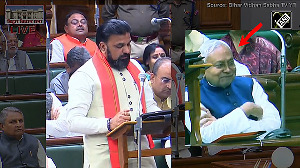 The underlying business sentiment for the first quarter of this year declined marginally amid concerns regarding industrial production, fiscal deficit and policy rates, a Dun & Bradstreet report says.
The underlying business sentiment for the first quarter of this year declined marginally amid concerns regarding industrial production, fiscal deficit and policy rates, a Dun & Bradstreet report says.
According to the research firm, the Business Optimism Index (BOI), which measures the pulse of the business community, stood at 129.4 for the January-March 2015, a decline of 6.0 per cent as compared to the October-December quarter of 2014.
Based on the responses received, it was observed that five out of the six optimism indices -- volume of sales, new orders, net profits, selling Prices and inventory levels -- have registered a decrease as against the fourth quarter of last year.
"D&B Composite Business Optimism Index during Q1 2015 declined by 6 per cent as compared to the previous quarter amid concerns surrounding the contraction in industrial production, apprehension about fiscal deficit and RBI's decision to keep policy rates unchanged," Dun & Bradstreet President and Managing Director - India Kaushal Sampat said.
"Compounding the economic weakness was the political stalemate in the Upper House, which prevented some crucial pro-reforms bills from getting passed," he added.
These developments during the survey period could have played a role in tempering business confidence with regard to the January-March period of 2015, the report said, adding that "the government's recourse to ordinances in the last two weeks underlines its resolve to break the legislative impasse and create a conducive environment for reviving investments.
"However, for business confidence to get a sustained boost, it is pertinent that these ordinances are passed as full-fledged legislation in the Budget session".
For calculating the composite BOI, each of the six parameters – net sales, net profits, selling prices, new orders, inventories and employee levels – is assigned a weight.
The parameter weights are then applied to these ratios and the results aggregated to arrive at the Composite Business Optimism Index.











 © 2025
© 2025